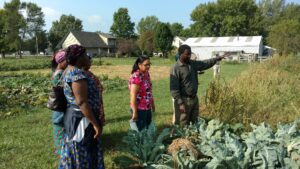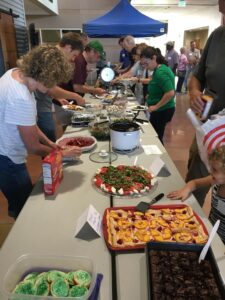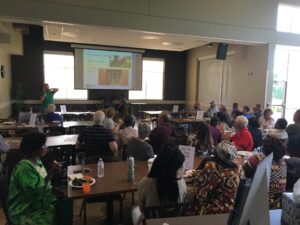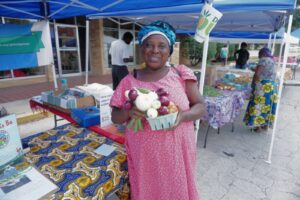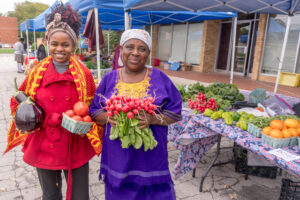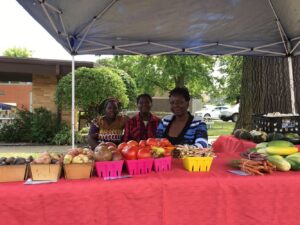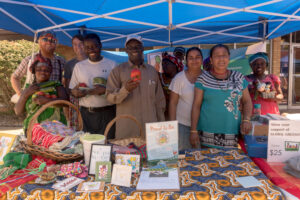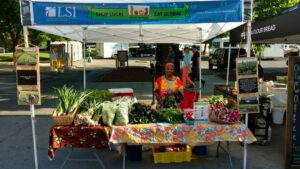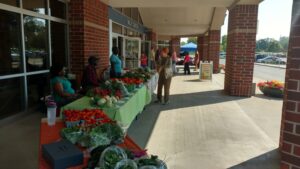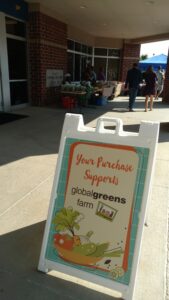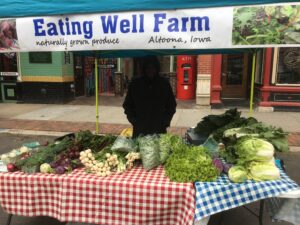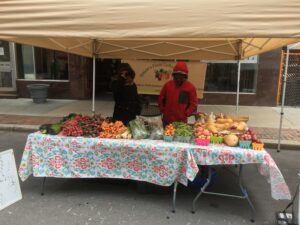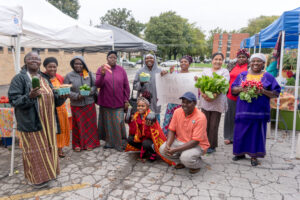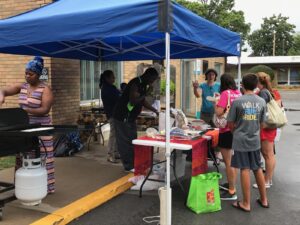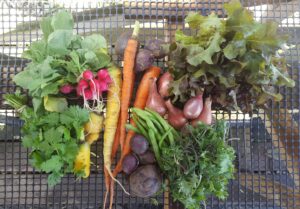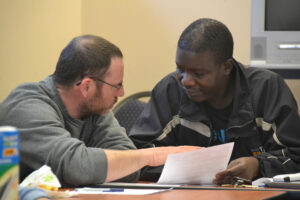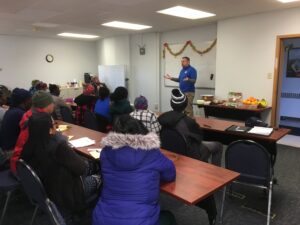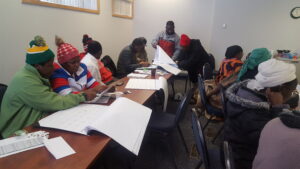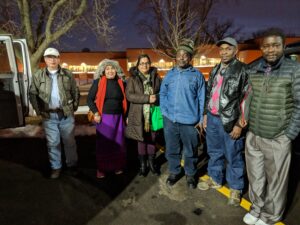Report for LNC16-386
Project Information
This proposal seeks to address the barriers that former refugee farmers in Iowa, specifically in Central Iowa, face in utilizing their farming skills and experiences to start or improve the profitability of their farming enterprises. LSI will help these farmers overcome these barriers by providing access to land at a training farm and will provide culturally and linguistically appropriate education, training, and technical assistance on developing a sustainable farming business. Farmers will be supported for multiple years in developing their business on the training farm and then will be assisted in transitioning their business to another piece of land where they will operate their business independently. The outcomes of the proposal are to help 34 beginning refugee farmers gain knowledge and skills that they will put into practice in order to increase the profitability of their farming business. Another outcome of the project is to assist 8 of the farmers in transitioning their businesses to independent land and operation. The outcomes will help to improve the profitability of these farmers, ensure that their farm land is being cared for in a sustainable manner, and improve the quality of life for the farmers and their communities through increased profits, fulfilling their desires to use existing skills, and through an increase in locally, sustainably grown produce. Project outcomes will also benefit other Iowa communities and refugee beginning farmers in the state and North Central Region (NCR) with whom the project participants and investigators will be sharing the results.
Expected Learning Outcomes
• Thirty-Four beginning farmers will increase knowledge and skills necessary to start and/or expand their
sustainable vegetable farming enterprises.
Expected Action Outcomes
• Thirty-Four beginning farmers will use their new knowledge and skills to increase profits earned from a new or
existing farm business.
• Eight beginning farmers will transition from the training farm and continue to operate their farming enterprise
independently.
Primary beneficiaries are beginning refugee farmers in Central Iowa. Secondary beneficiaries are other Iowa and
NCR refugee beginning farmers and the organizations assisting them. The tertiary beneficiary is the local food
system in Central Iowa.
Research
Education
Program Team
The Global Greens team includes the following personnel who deliver program services to refugee clients served by this project:
The Economic Development Supervisor leads the project and manages program grants while also supporting the Global Greens team in their various roles.
The Food Hub Specialist manages the Community Supported (CSA) program and assists in the delivery of technical assistance to farmers in the program.
The Business Development Specialist (formerly called Farm Marketing Specialist) supports refugee clients by providing direct instruction to growers in the areas of small business goals and record keeping of production, sales and farm financial management.
The Community Garden Associate manages Global Green’ Community Garden Program. This involves managing referrals for clients who have come to United States as refugees, managing LSI’s community garden waitlist, and working closely with the City of Des Moines and other private community gardens to coordinate plot assignments and garden orientations. This role also offers general technical assistance and training to gardeners in the program
The Land & Production Specialist manages the farm incubator site and leads the technical assistance to growers in the program.
Bilingual Community Associates (BCAs) provide direct services to clients that are receiving LSI services with a focus on overcoming language and cultural differences and reducing barriers to work towards community integration and self sufficiency. Will evaluate potential and current clients to assist them in reducing barriers to access and understand LSI services and community resources. Communicate information to clients from educational classes, appointments, and paperwork. Work with community partners, volunteers, and staff to ensure high and efficient quality of service to clients in a plan of action that supports client goals. Interpretation is a critical component of providing any sort of training, technical assistance or communication when working with beginning farmers who have varied English language abilities. It is especially critical when communicating program expectations, policies, and procedures but also important to ensure that there is effective two-way communication. Growers need to be able to ask pertinent questions, clarify expectations, and express themselves to the LSI Global Greens staff working with them.
Program Participants
LSI's Global Greens urban agriculture program serves individuals and families that have come to Des Moines through the U.S. Refugee Resettlement Program. There are over 8 different ethnicities who participate in the program, with the majority of participants originating from Burma, Bhutan, and Burundi. Most have been in the United States between 1-8 years and have come from agricultural backgrounds. Prior to coming to the U.S. the majority of participants had spent the last 10-30 years living in refugee camps with limited opportunities for education or employment. Most participants are still in the process of acquiring English language skills and are considered to be low-income.
Program Approach
Over the years, LSI has identified there are really five phases to this process for farmers to be considered fully independent. While three farming families are currently in the process of transitioning onto alternative land options over a three year period, it has been found that this is not a true independent transition but rather a new phase of support. Program Phases include:
- Phase 1 connects refugee gardeners to small community garden plots near their homes and neighborhoods.
- Phase 2 provides a training farm program with larger plots of land and the intensive support and training for farmers with at least one year of community garden experience to develop viable small-market businesses over a three to five year period through gradual exposure to farm operating costs.
- Phase 3 provides additional land for farmers to complete at least a year in partial transition where they expand their land size while still receiving supports and infrastructure at the LSI Global Greens training farm
- Phase 4 transitions farmers off of the training farm and on to their own land providing supports to develop their new site and graduated supports in all other areas of their business
- Phase 5 is when a farmer is well connected to supports outside of LSI and has no contractual agreement with LSI for technical assistance, however, farmers would still be allowed to sell into the LSI Food Hub at this point with an aggregation fee.
Why Refugee Incubator Farms are Important
LSI's Global Greens program is helping to improve the health and well-being of refugee adults and children through increasing the availability of and access to fresh, healthy food to refugee growers, their families and the wider community. When LSI first began its Global Greens program in 2010, interested growers expressed many reasons for wanting to grow food again. Among them were:
- A desire to have better access to fresh healthy foods that they were accustomed to growing in their home countries and find to be expensive, low quality and/or impossible to find in local grocery stores.
- A desire to use the wealth of experience and skills that they brought with them to this country
- The benefits of physical exercise that they were accustomed to from farming back home
- Mental health benefits, emotional healing and the ability to have a connection to something familiar in their new community
Training: Efficiency and Scheduling
The give and take of the staff role and farmer responsibility is a constant tension within any training program. Staff want to give farmers the space to grow and learn and not get everything right the first time; however, there are many skills in which the farmers need to continue building more independence, and it is a struggle to always know when that time is appropriate. Involving farmers in various processes can often take more time than staff doing things and this is sometimes the preference of both parties when time is limited, however, it is important to take every opportunity for training and experiential learning when possible.
Training time becomes a barrier especially during the growing season. Many farmers also work full-time jobs and take care of family; therefore, it is difficult to have farmers come in to the office for meetings about record keeping and business planning during the season in addition to in-field check-ins and trainings. Staff have found that individualized and small group trainings work best during the season and save large group trainings for the off-season. Staff continues to be flexible but struggle at times knowing that farmers need to be more a part of what takes place in the office at a more administrative level. As an incubator program you will need to decide how firm you will be on training attendance and farmers’ schedules fitting program scheduling as you enroll farmers into your program. It is very time consuming to make exceptions for farmers who have alternate schedules. LSI has generally been more flexible in this area for BMF level farmers rather than AMF and Transitioning farmers.
Another note of consideration is who you will identify as the “farmer” in the program. Farmers often operate their farm as a family unit and sometimes various family members will attend trainings depending on who is available. Again, this will be a tension you will have to decide if you want to be flexible with in your program.
General Training Schedule
Over the course of the project LSI staff have found the following calendar for trainings to be a successful, general model. Specialized introductory trainings must be offered each year to new farmers in the program as well as separate trainings for advanced and/or transitioning farmers. Transitioning farmers move to more of a one-on-one model with staff as their training needs become more individualized. However, LSI has found that hosting group trainings in the off-season with all levels of farmers is a successful model in order to continue to review concepts and for more experienced farmers to share ideas with new farmers. This also presents a forum for farmers to decide on issues collaboratively as positive community functioning is an essential part of the success of the incubator farm site.
At the end of each season LSI greatly values the time staff have to sit down with each farmer and review the season. LSI formally uses the term evaluation however this model is much more of a conversation and a farmer self-evaluation rather than LSI staff evaluating the farmer. Each evaluation consists of asking reflection questions on the season and plans for the next year. It is important to keep having conversations with the farmers around how their goals are changing each year. Many farmers come into the program wanting many acres of land and imagining the size of their farm back home however, many farmers’ goals change as they gain more experience in the program and learn about how different farming is in the context of their new life in the U.S.
During this meeting time LSI also completes a Skills and Knowledge Assessment with all AMFs and Transitioning farmers in which farmers assess their progress in various skill areas. AMFs and Transitioning farmers also set goals for the coming season and reflect on their progress from the previous years’ goals.
Adapting Trainings to Low Literacy and/or Non-English Speaking Farmers
LSI training modules have been adapted over the years of the project to be more applicable to working with low literacy, non-English speaking farmers. Much of this has come through LSI being a “tester” organization for the ISED (Institute for Social and Economic Development) Beginning Farmer and Rancher Development Program (BFRDP) Teaching and Technical Assistance (T&TA) program in partnership with NIFTI. The primary objective of the grant is development, piloting and dissemination of new and revised T&TA resources appropriate to refugees with little or no literacy, English language proficiency, and with limited education. Webinar training recordings and reading suggestions from this project can be found in Appendix 13. This project is still in its finalization and there is not yet a formal platform for this information. For more information contact Dani Scherer, Education Specialist ISED Solutions dani.m.scherer@gmail.com, 1-845 548 7514
Whole family Evaluation Model
As much as possible, it is helpful to have all family members involved in the farming business at the evaluation meeting. For most farmers, farming and selling their food involves many family members and LSI wants to be able to account for the full body of knowledge represented within the family unit. When English is a limiting factor farmers must rely on staff or family members to assist with some of the administrative parts of their business, and LSI wants to make the necessary connections with those family members to set administrative goals for the coming season. However, in some cases it is difficult to identify someone who can fulfill this role or adult children who often fill this role are busy with school or leave for college and cannot be counted on as a consistent resource for this assistance. LSI is looking at being more selective in who can enroll in certain market opportunities, especially those with more intensive administrative pieces.
As much as possible, in interviewing farmers it is important to evaluate each farmer holistically when assessing the challenges and opportunities in incubating their farm business. It is important to be very clear and realistic about expectations that will be held at each level of the program and the challenges of increased responsibilities, especially in relation to each farmer’s specific situation. Some of the key considerations that have proved helpful to LSI and have been incorporated in its interview and evaluation process include:
- Language Proficiency
- Personality Type
- Time Availability
- Transportation Resources
- Family/Friend Support Network
- Social and Economic Stability
Each farmer is unique and has different strengths and skills that will impact which markets they are best-suited to pursue. Farmers’ lives outside of farming are directly related to how successful they can be as farm business owners.
Project Activities
Educational & Outreach Activities
Participation Summary:
2017
Consultations (1)
Global Greens Economic Development Supervisor provided free consultation with Morgan Hoenig, Local Foods Coordinator at ISU, on program development. Talked through some of the challenges her program was facing, offered some options/solutions to try out, and shared out GG program toolkit with her as a resource as well as showed he resources on NIFTI and ISED websites.
Awards
LSI Global Greens program received the OpportUNITY Leading the Way Award from United Way of Central Iowa on October 24, 2017.
Press (5 articles 1 radio interview)
Born to Farm – Marie Kashindi
https://www.unitedwaydm.org/stories/born-to-farm
Iowa Public Radio: Talk of Iowa – GG staff talked about refugees in Iowa & the role Global Greens plays in that on January 13, 2017.
Channel 5 We Are Iowa Weekend
http://www.weareiowa.com/news/local-news/global-greens-farmers-market/778344250
Drake University Times-Delphic
https://timesdelphic.com/2017/10/05/local-farmers-market-part-of-refugee-resettlement-program
AP story in Des Moines Register
Iowa Farmer Today
Newsletters (52 newsletters)
During the reporting period, Global Greens Staff continued to send out the weekly Global Greens Program e-newsletter, The Dirt, with event and program updates, a produce list of what to expect at market and a recipe.
Tours
17 groups (small to large) visited the Global Greens Farm for tours and these groups volunteered at the farm for a total of 700 hours.
40 Global Youth Institute/World Food Prize delegates from around the US and the world toured the GG incubator farm on October 20, 2017.
Presentations (15)
- 10/10/16 – hosted a group of young women from the Young Women’s Resource Group at the farm Farm Marketing Specialist talked about our program and healthy food.
- 10/27/16 – Regional Food Systems Working Group Quarterly Meeting – Theme: Towards a Culture of Welcome in the Iowa Food System – Two Global Greens staff and three farmers talked about the program, farmers shared some of their farm story, farmers also spoke during a presentation by Aryn McLaren about Double Up Food Bucks
- 2/4/17 – Iowa Farmers’ Market Association Workshop – GG staff presented with Aubrey Alvarez from Eat Greater Des Moines on Global Greens and DUFB.
- 3/4/17 – Feed Greater Des Moines – Farm Marketing Specialist sat on panel on local foods and workshop with Alda Helvey from Central Iowa Shelter and Services on job skills and training aspects of Global Greens
- 3/18/17 – Greater Des Moines Botanical Garden Learn on Saturdays – GG staff presented on program history and overview of program.
- 5/23/17 – Des Moines Area Religious Council Food Pantry Directors – Farm Marketing Specialist presented on Global Greens and Double Up Food Bucks.
- 6/12/17 – Faith Lutheran Vacation Bible School – Farmer and LSI philanthropy staff shared Tika Bhandari's story and her experiences in Global Greens program.
- 6/16/2017 - Eastern Iowa Refugee Summit - Exhibitor table and presentation by LSI Refugee Community Services Director and Global Greens Economic Development Supervisor.
- 6/22/2017- Wells Fargo Des Moines Campus- Exhibitor table and presentation to 30 WF employees about refugees and our programs including Global Greens.
- 7/12/17 – Mandela Fellows/Young African Leaders Institute at GG Farm – 4 GG staff talked about program, gave a tour of the farm, and then worked with fellows at incubator farm.
- 8/2/17 – Lutheran Services in America – Disability Network at VCC & GG Farm – 3 GG staff and 2 farmers presented to 30 members of LSI Disability Network and then gave a tour of the farm.
- 9/15/17 – World Food & Music Festival – Global Greens staff had exhibitor table and they played veggie ID game with attendees, sold program T-shirts, and shared general program information with attendees.
- 10/16/17 – Iowa Hunger Summit – GG staff presented on program and had exhibitor table at event. Iowa-Hunger-Summit-10.16.17
- 11/11/17 – Tri-State Women in Sustainable Agriculture Retreat - Farmer and Global Greens AmeriCorps Vista did a “virtual tour” of her farm with attendees.
- 12/5/17 – Healthy Food Stakeholder Meeting – Food Hub Specialist presented on Global Greens program and gave LFPP grant feasibility study update.
2018
Consultations (3)
- Global Greens Supervisor provided program toolkit and consultation assistance with Springfield Community Gardens in Springfield, MO. The program is exploring an incubator model. An in-person visit is also scheduled for March 2019.
- Global Greens Food Hub Specialist provided consultation support to Putnam County School District in Florida. An in-person visit will also be held in early 2019.
- Global Greens staff offered a field day to other interested programs on June 28, 2018. Iowa State University Extension, University of Northern Iowa Local Food Program, EMBARC, FoodCorps, and Black Hawk County Public Health representatives attended the event that included four site visits, Global Greens toolkit overview, and time for networking.
Curricula/Factsheets (1)
Global Greens staff developed a new program curriculum that addresses specific learning needs of farmers at different phases of the program. The curriculum is titled Holistic Experiential Learning Design (HELD) and covers business management, production, and life skills. Lesson plans will be developed for each workshop area, one class tailored to Beginning Market Farmers (BMFs) and one class tailored to Advanced Market Farmers (AMFs).
Press (1 article)
Des Moines Register
Newsletters (30 Dirt, 21 CSA)
Global Greens Staff continued to send out the weekly Global Greens Program e-newsletter, The Dirt, with event and program updates, a produce list of what to expect at market and a recipe. The Global Greens CSA also developed a weekly newsletter to go with boxes that provided farmer stories and recipes specific to the share.
Tours
15 groups (small to large) visited the Global Greens Farm comprising 152 people for a total of 514 hours of volunteer support.
Presentations (17)
- 2/27/18- Eat Greater Des Moines- Global Greens program presentation
- 3/24/18- Vegan Fest Des Moines- Global Greens staff provided a booth with program information and CSA signs. A vegetable identification game was also offered.
- 4/8/18- Gateway Church- Food Hub Specialist presented re: Global Greens CSA
- 4/21/18- Des Moines Botanical Center Earth Day Event- Exhibitor table and vegetable identification game
- 4/23/18 Lutheran Church of Hope Ankeny- FHS gave Global Greens overview and information about CSA
- 5/6/18-Westminster Presbyterian-FHS gave program history and information about CSA
- 5/06/18- First Unitarian Church- Global Greens I think Meghan did this one… provider program history and overview of program.
- 6/14/18- Des Moines Botanical Center Social Irrigation- Exhibitor table providing information about Global Greens program.
- 6/18 GG Field Visit Day-GG Staff presented and gave tour of farm/community gardens
- 7/23/18- Mandela Fellow/Young African Leaders Institute at GG Farm- 3 Global Greens staff shared program history, gave farm tour, and provided volunteer opportunity at farm
- 9/14/18 Empower Lunch Tours by GG Staff
- 10/17/18 Wallace Center- Global Greens Business Development Specialist presented on program
- 11/1/18- Des Moines Task Force on Sustainability- Global Greens Farm and Program Supervisor Presented on program and participated in discussion on climate change.
- 11/2/18- Women Food and Agriculture Conference Field Day- Program Supervisor talked about refugee resettlement and Global Greens history and provided farm tour.
- 11/13/18-Global Greens Land Pitch- Global Greens staff presented plan for 100 acre incubator farm site within 20 miles of Des Moines to PFI, Greater Des Moines Partnership, Des Moines Community Foundation, and other interested parties
- 11/19/20- Iowa Organic Conference, Land and Production Specialist presented on “Community Farms Feeding Iowa” panel
- 11/20/18- Central College Sustainability Class- Program Supervisor presented on history and overview of program and shared summer internship opportunities
Learning Outcomes
- Crop Planning
- Food Safety & Food safety Audits
- Organic Farming
- Pest and Disease Management
- Seed Ordering
- Greenhouse production, seedlings, plant transplants
- WIC and Senior Vouchers
- Farm Orientation
- Equipment Usage & Safety
- Cover Crop Swaps
- Production Techniques (weed fabric and drip tape)
- English for Customer Service
- Recordkeeping
- Business Planning
Project Outcomes
In 2018, farmers learned how to use drip tape and row covers at a scale that is appropriate for seasonally rotating plots at the incubator training farm.
Farmers completed a food safety audit of their site and developed new best practices for post harvest handling and storage.
The Global Greens farmer first grew up in a valley beneath the Himalayan Mountains in the country of Bhutan. “I spent my whole life as a farmer back in Bhutan,” she says. The family owned about 8 acres of land, 4 of which were dedicated to rice production. The other four acres were used for livestock and vegetables. They grew everything from corn, millet, wheat and lentils to peppers, mustard greens, garlic and ginger.
Every morning, she would get up, cook food and get kids ready for school. Once they were off to school, she would start working on her farm. After lunchtime, she would work alongside other families in her community on their farms. The other 15 families in her immediate community would gather together and help each other with larger tasks such as planting rice or harvesting grain. She describes this system, called “parma” in Nepali, as “helping each other without paying each other.” The families in the community would take turns helping each other and being helped. In this way, everyone pitched in to make sure everyone got their big projects completed.
When the summer heat came to the valley, she says that she was the opposite of a snow bird. She herded the livestock out of the valley and higher up into the Himalayan Mountains where it was cooler and the family owned more land. There, she would tend the orchard which filled orange trees and cardamom plants and take care of the livestock. The livestock benefited from the cooler weather and lush grass while the orchard benefited from the livestock manure and Ran’s care. She lived in a temporary shelter for a few months, walking home occasionally for more supplies.
Amid all of the hustle and bustle of operating her farm, this farmer gave birth to seven children in Bhutan. She lived in Bhutan for thirty years before having to leave due to violence against her ethnic group. She and her family fled to Nepal and ended up in a refugee camp there. “The camp was miserable because I had a lot of kids and I did not enough space or food for them all. It was hard to survive." The only food came from rations that were given out, but those weren’t enough to feed her growing family. She quickly realized that she needed to earn an income to make sure her family survived in the refugee camp. She started a small grocery business which she operated for 21 of the 22 years that she lived in the refugee camp. By four o’clock each morning, she would leave the camp and walk to a nearby village where she would purchase yogurt, milk, butter and vegetables. She hauled the food back to the camp where she would sell these items at a mark up. “That was the only income for our family” she explains. “I was able to pay for the clothes, notebooks and books that my children needed for school.” She was also able to pay for her children to attend high school which was not free like grade school was.
After living for many years in the refugee camp in Nepal, the family decided it was time to apply to be resettled to another country since it was not going to be possible to go back to their village in Bhutan. They were accepted to move to the United States. “It was hard to leave,” she describes, “America is totally different—different part of the world, different language. I was worried about life in America. We knew our kids would have a better future in America.”
They were resettled to Colorado. When she arrived, she was happy because she quickly met friends and family members who also lived in Colorado. After living for about four years in Colorado, she began to have more difficulty with her asthma. The thin, dry mountain air caused her to wake up at night to bouts of coughing. She visited Des Moines by herself for ten days, staying with friends. The nights in Iowa were the first time that she was able to sleep the whole night through without waking up to cough in many months. After returning to Colorado, she suggested that the rest of her family visit Des Moines to decide if they should move there. After they visited, the family decided together that they would move to Iowa. She comments that she liked the trees, the environment and the people. Family members could find jobs in Des Moines, too.
After moving to Des Moines in 2015, she participated in a new community garden that was started in 2017 in a partnership between Cornerstone Family Church and LSI. She explains that she was happy with her garden. “I got a basketful of vegetables every week that would last us the entire week. We cultivated good vegetables—a lot of mustard greens, potatoes and pumpkins.” After spending one year in her community garden, she applied and was accepted to start gardening at Global Greens Farm in 2018. When she talks about having a larger garden at Global Greens Farm, a huge smile spreads across her face. “I am excited to have a bigger garden. I want a bigger garden because it reminds me of Bhutan. It also helps me to exercise and I can make some money when I sell the food. It will save me money on groceries. If I bought produce from the supermarket, when was it harvested? The taste is different. My vegetables are healthy and tasty.”
Life is quite different the family here in America. The couple now owns a house in Des Moines and live with four of their children. Two are in school and the other two work full-time. She is no longer the sole economic provider for the family. The drive to work and provide for her family so evident in her previous life, however, is not diminished. She will continue to provide for her family by growing food for them and selling the excess. Ran has already organized a car pool for herself and friends who live near her and will be gardening at Global Greens Farm, hearkening back to “parma” in Bhutan. All she needs now is for spring to come so she can put seeds in the ground.

